- Michael Jackson's mom and kids accuse AEG Live of pressuring Dr. Conrad Murray
- A "smoking gun" e-mail ties AEG Live to Murray, Jackson attorney says
- Concert promoter AEG Live argues it did not hire or supervise Murray
- Murray is serving a prison sentence for Jackson's 2009 death
Los Angeles (CNN) -- A "smoking gun" e-mail allegedly connecting a concert promoter to Michael Jackson's death was revealed this week as a judge unsealed documents in the wrongful death lawsuit filed by Jackson's mother and children.
The trial next month in Los Angeles could shed new light on the pop icon's last days as Dr. Conrad Murray, who did not testify at his own involuntary manslaughter trial, and Jackson's oldest son Prince, 16, are on the witness list.
Jackson died two weeks before his "This Is It" comeback concerts, organized by AEG Live, were to have debuted in London in the summer of 2009. E-mails suggested that the promoter was worried about Jackson's missed rehearsals and they sought Murray's help in getting him ready.
Prince, Paris and Blanket Jackson and their grandmother, Katherine Jackson, contend that AEG Live's pressure on Murray to have Michael Jackson ready for daily rehearsals despite his fragile health led to his death from an overdose of surgical anesthetic.
 Joe Jackson: I see Michael in 'Blanket'
Joe Jackson: I see Michael in 'Blanket'
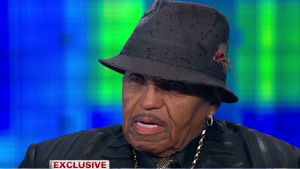 Jackson: Family couldn't get to him
Jackson: Family couldn't get to him
 Michael Jackson $1B estate debate
Michael Jackson $1B estate debate
 Michael Jackson's son makes TV debut
Michael Jackson's son makes TV debut
The judge ruled Wednesday that Jackson lawyers have shown enough evidence that AEG Live hired and supervised Murray to warrant a jury trial. She also ruled there was evidence to support the Jacksons' claim that AEG Live executives could have foreseen that Murray would use dangerous drugs in treating the pop icon.
"Now that the court has ruled that there is evidence that it was foreseeable that AEG's actions resulted in Michael Jackson's death, the Jackson family feels vindicated from the public smear campaign that AEG has waged against them," Jackson lawyer Kevin Boyle said Sunday. "The truth about what happened to Michael, which AEG has tried to keep hidden from the public since the day Michael died, is finally emerging. We look forward to the trial where the rest of the story will come to light."
A cornerstone of the Jacksons' case is an e-mail AEG Live Co-CEO Paul Gongaware wrote 11 days before Jackson's June 25, 2009, death. The e-mail to show director Kenny Ortega addressed concerns that Murray had kept Jackson from a rehearsal the day before: "We want to remind (Murray) that it is AEG, not MJ, who is paying his salary. We want to remind him what is expected of him."
Jackson lawyers, calling it a "smoking gun," argue the e-mail is evidence that AEG Live used Murray's fear of losing his $150,000-a-month job as Jackson's personal physician to pressure him to have Jackson ready for rehearsals despite his fragile health.
Ortega, who had worked closely with Jackson on previous tours, sounded a loud warning about his health after Jackson showed up for a rehearsal shivering just over a week before his death. He wrote in an e-mail to AEG Live President Randy Phillips: "It is like there are two people there. One (deep inside) trying to hold on to what he was and still can be and not wanting us to quit him, the other in this weakened and troubled state. I believe we need professional guidance in this matter."
Phillips responded with a glowing endorsement of Murray: "This doctor is extremely successful (we check everyone out) and does not need this gig so he is totally unbiased and ethical."
Jackson lawyers point to another e-mail exchange as evidence that Phillips was directly involved with pressuring Murray to have Jackson at rehearsals. The e-mail was sent by AEG Live tour accountant Timm Woolley to an insurance broker two days before Jackson died: "Randy Phillips and Dr. Murray are responsible for MJ rehearsal and attendance schedule."
Murray told investigators two days after Jackson's death that he used the surgical anesthetic propofol every night for two months to help him rest for rehearsals. It was a procedure Jackson demanded, he said. The Los Angeles County coroner ruled that Jackson had died from an overdose of propofol in combination with sedatives. Murray is serving a prison sentence for his involuntary manslaughter conviction.
AEG Live argues it has no liability in Jackson's death because Murray was not its employee. AEG lawyer Marvin Putnam did not respond Sunday to CNN calls for comment, but he did give a short statement last year: "Defendants did not hire Dr. Murray nor were they responsible for the death of Michael Jackson."
The lawsuit seeks a judgment against AEG Live equal to the money Jackson would have earned over the course of his remaining lifetime if he had not died in 2009. If AEG Live is found liable, it could cost the company several billion dollars, according to estimates of Jackson's income potential. AEG Live is a subsidiary of AEG, a global entertainment company that is now for sale with an $8 billion asking price.
Los Angeles County Superior Court Judge Yvette Palazuelos, in her ruling rejecting AEG Live's request to have the case thrown out, said she agreed that the Jackson lawyers provided evidence that AEG Live didn't do "a sufficient background check of Dr. Murray, which would have established that Murray was deeply in debt."
Jackson's previous relationship with Murray, who treated him and his children for minor illnesses in Las Vegas, did not relieve AEG Live of liability, "although the fact may be relevant in determining proportional liability and damages," she said.
While the AEG Live lawyers argued the company could not have foreseen that Murray might use dangerous drugs on Jackson in preparation for the tour, Palazuelos said there was evidence that Gongaware had "previous tour experiences" with Jackson in which "tour doctors" gave "large amounts of drugs/controlled substances to him." Gongaware testified in Murray's trial that he worked as tour manager for Jackson's "Dangerous" and "History" tours before joining AEG Live.
The judge cited "Gongaware's general knowledge of the ethical issues surrounding 'tour doctors' and the practice of administering drugs to performing artists."
"There is a triable issue of fact as to whether it was foreseeable that such a physician under strong financial pressure may compromise his Hippocratic Oath and do what was known by AEG Live's executives to be an unfortunate practice in the entertainment industry for financial gain," the judge wrote.
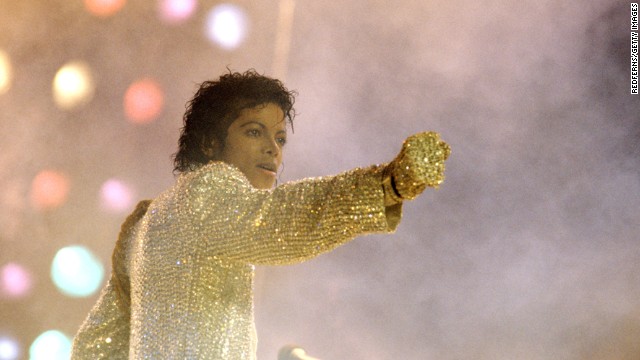 The death in 2009 of superstar Michael Jackson, who died of cardiac arrest at the age of 50, sent shockwaves around the world.
The death in 2009 of superstar Michael Jackson, who died of cardiac arrest at the age of 50, sent shockwaves around the world.
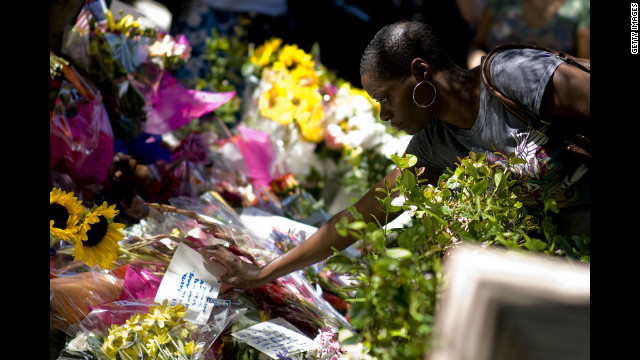 Jackson's death caused an outpouring of grief from fans. Here, a fan places flowers at a makeshift memorial outside the Jackson family compound in Encino, California, the day after his death.
Jackson's death caused an outpouring of grief from fans. Here, a fan places flowers at a makeshift memorial outside the Jackson family compound in Encino, California, the day after his death.
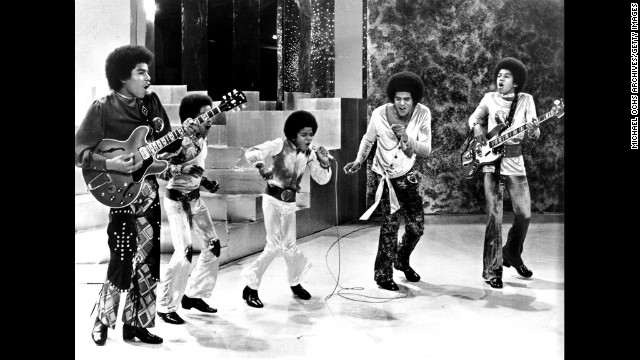 The Jackson 5 perform on a TV show circa 1969. From left, Tito Jackson, Marlon Jackson, Michael Jackson, Jackie Jackson and Jermaine Jackson.
The Jackson 5 perform on a TV show circa 1969. From left, Tito Jackson, Marlon Jackson, Michael Jackson, Jackie Jackson and Jermaine Jackson.
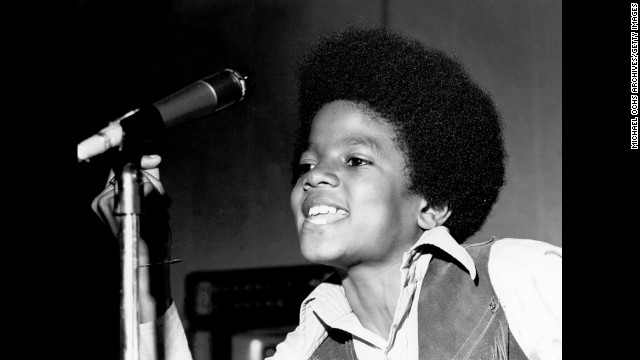 Michael Jackson quickly became the stand out star of the Jackson 5. Here he performs onstage circa 1970.
Michael Jackson quickly became the stand out star of the Jackson 5. Here he performs onstage circa 1970.
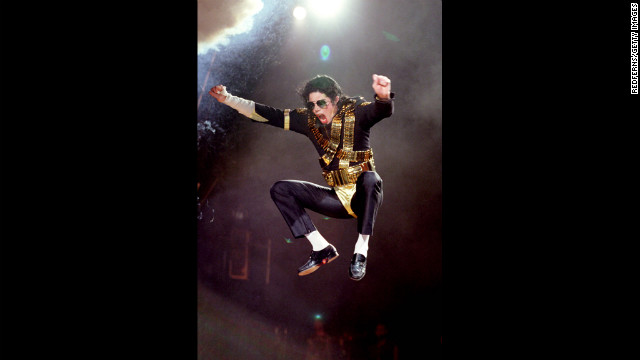 Known for his dance moves, Jackson is seen here jumping in the air while performing during the Dangerous tour in 1992.
Known for his dance moves, Jackson is seen here jumping in the air while performing during the Dangerous tour in 1992.
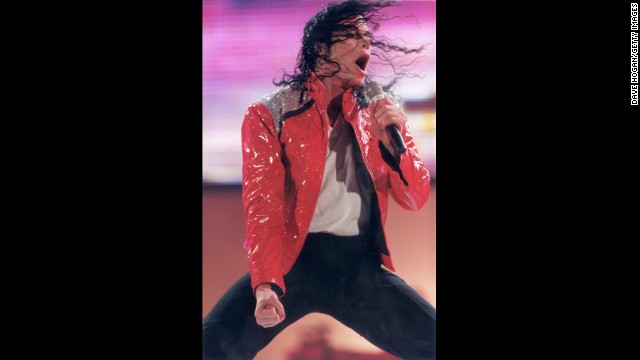 Jackson broke a world record during the Bad tour in 1988 when 504,000 people attending seven sold-out shows at Wembley Stadium in London.
Jackson broke a world record during the Bad tour in 1988 when 504,000 people attending seven sold-out shows at Wembley Stadium in London.
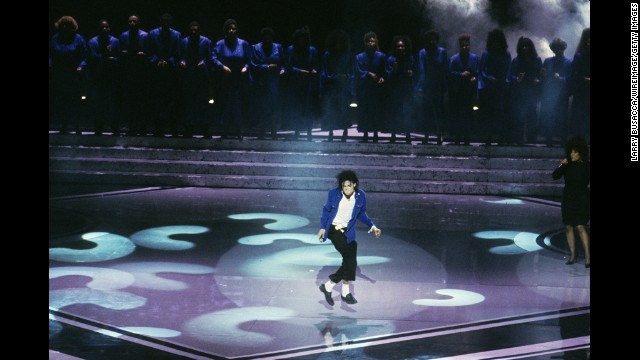 Jackson perfoms in concert circa 1991 in New York City.
Jackson perfoms in concert circa 1991 in New York City.
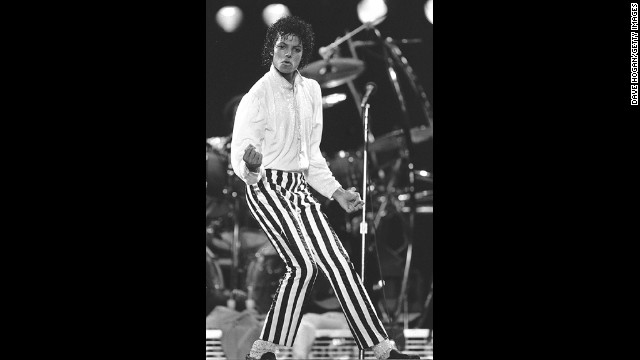 Jackson achieved superstardom with his solo career in the 1980s. Here Jackson is shown on stage in Kansas in 1983.
Jackson achieved superstardom with his solo career in the 1980s. Here Jackson is shown on stage in Kansas in 1983.
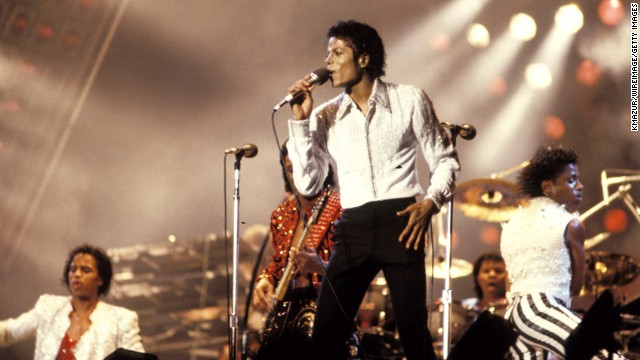 Michael Jackson performs on stage circa 1990.
Michael Jackson performs on stage circa 1990.
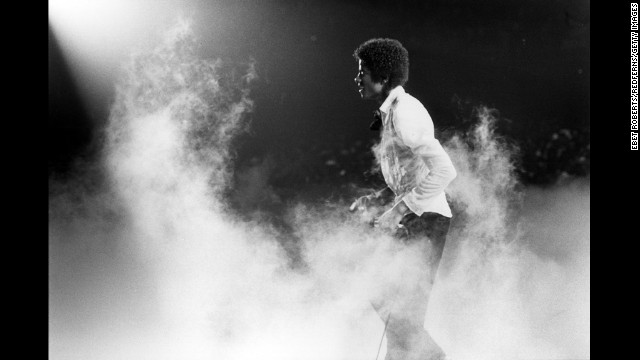 Michael Jackson performs with The Jacksons in New Orleans on October 3, 1979.
Michael Jackson performs with The Jacksons in New Orleans on October 3, 1979.
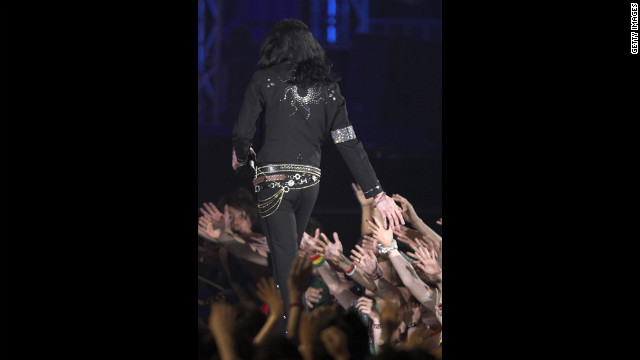 Michael Jackson earned the Legend Award during the MTV Video Music Awards in Tokyo in 2006.
Michael Jackson earned the Legend Award during the MTV Video Music Awards in Tokyo in 2006.
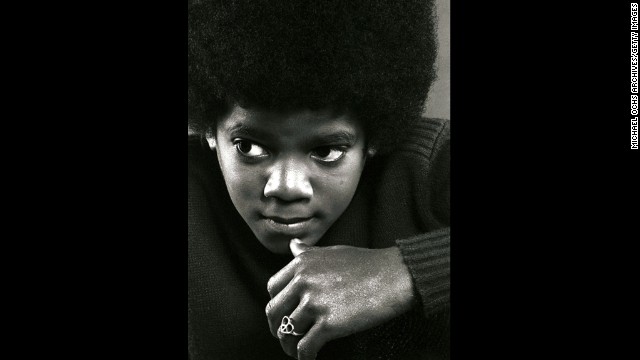 Michael Jackson poses during a portrait session in Los Angeles in 1971.
Michael Jackson poses during a portrait session in Los Angeles in 1971.
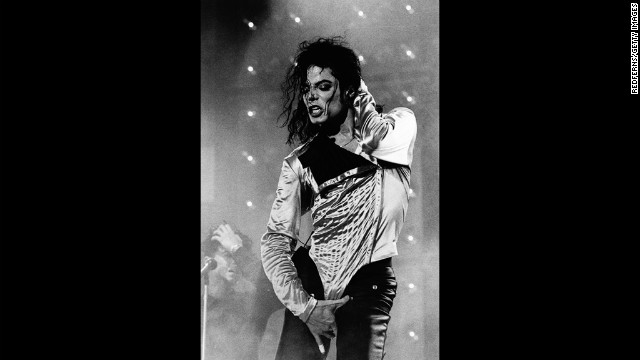 Michael Jackson performs in Rotterdam, Netherlands.
Michael Jackson performs in Rotterdam, Netherlands.
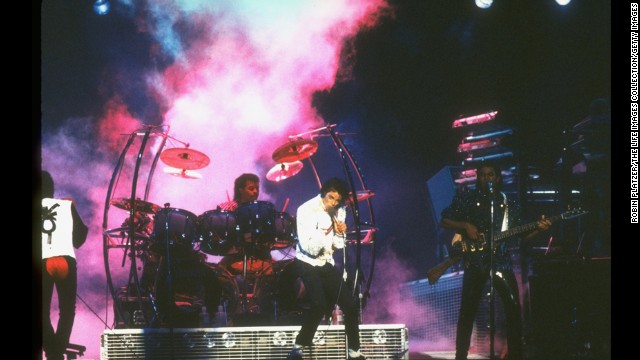 Jackson performs with his brothers.
Jackson performs with his brothers.
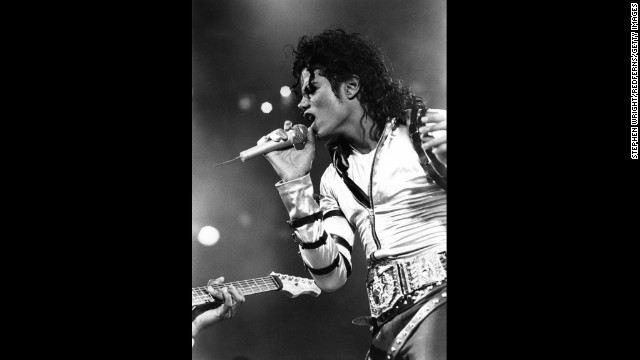 Jackson performs during the Bad tour at Wembley Stadium in London.
Jackson performs during the Bad tour at Wembley Stadium in London.
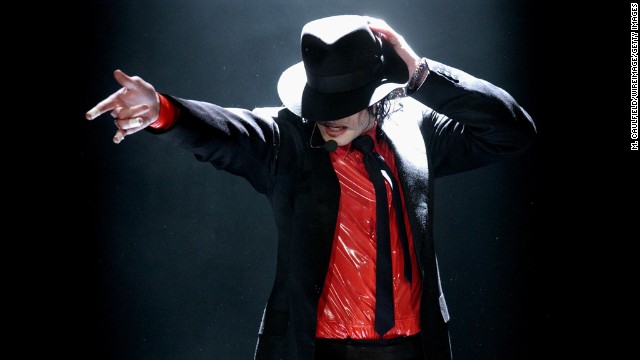 Jackson performs during the taping of "American Bandstand's 50th: A Celebration" in 2002.
Jackson performs during the taping of "American Bandstand's 50th: A Celebration" in 2002.















